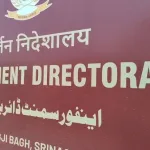A famous proverb goes, “Teachers open the door but you must enter by yourself”. No matter how good and dedicated teachers are, students need to be willing to learn and take the first step forward in gaining knowledge. True, teachers must be well trained, well motivated and well learnt. As the motto of the Department of Education, Jammu and Kashmir, is to raise the status of education, different training courses have been prepared to train teachers. One such course is NISHTHA.
Make no mistake, the National Initiative for School Heads and Teachers’ Holistic Advancement (NISHTHA) is a holistic training course aimed at empowering school teachers of all categories with a wealth of new methods and techniques of teaching. Plus, the course looks to be a promising candidate for cultivating a teaching temperament in all the school teachers from the primary level to the higher secondary school level.
In the first phase of the NISHTHA training course—conducted by the school Education and sponsored by the Samagra Shiksha Abhiyan and NCERT— teachers upto the high school level were required to study about eighteen modules on line; a book of modules was also provided possibly to each teacher. In the second phase, the masters/ teachers and lecturers of secondary and higher secondary level are currently undergoing the promising course. If executed properly, the trainings can light up the entire teaching-learning scenario at schools.
Every module not only enlightens a teacher about the flaws and weaknesses which have riddled the existing traditional teaching—learning mechanism of schools but also shifts focus to those areas of schooling which generally gain no/low attention in the classroom transaction. For example, the first module called “…Inclusive Education” advises teachers to refrain from gender stereotyping or of the students who belong to Scheduled Castes or Scheduled Tribe. The thrust of the module is to create not only an inclusive school but an inclusive society. This is a meaningful thought; its implementation can create a stress-free and cordial atmosphere at schools, allowing all students regardless of their social, economic and family background to feel a sense of belongingness at a school. In this climate, no student will feel isolated and perform poorly.
The pedagogy of languages is another module of immense importance and benefit for the students apart from teachers. The star attraction of this module is to educated teachers about the all-important role that their language plays in the schooling and education of a child. A language which uses discriminatory words and criticizes students inadequacies, if they underachieve, creates mental distances between a teacher and a victim student. In this situation, the student feels segregated and displays very poor interest in attending a school not to speak of displaying a good performance.
Loud and clear from the NISHTHA programme is the message that teachers cannot and should not hold only students responsible for their poor achievement. Rather, they need to analyze the inadequacies in the teaching-learning conditions as well. A responsible teacher is also required to learn him/herself during the course of imparting education. Apart from this, teachers need to ensure that their classroom is interactive, non-discriminatory, unbiased and unprejudiced. Most importantly, a classroom needs to be free of corporal punishment and abuse for students.
However, the NISHTHA cannot yield its promised fruit and steer the teaching-learning atmosphere at schools on road to improvement if the guidelines and techniques provided by it are not utilized. And a half-hearted approach if adopted to put the teaching mechanism in line with NISHTHA will not be productive.
For the successful execution of NISHTHA, both administrative and teacher support is required at every step. It is the administrative machinery whose watchful eyes and effective hands can ensure that the teaching-learning mechanism at schools practices the guidelines prescribed by NISHTHA. Though the school teachers are well-experienced and about 80% of them are familiar with the teaching techniques, methods and the temperament required for effective teaching, it is no secret that the administrative eye can yield richer dividends.
Additionally, the administration is better placed to see that that the teachers do not suffer with respect to their service record, salaries, promotions and transfer. Needless to say that unless teachers are happy and face no hurdles in the smooth conduct of their services, their performance is bound to remain poor—trainings notwithstanding.
To conclude, the administration and teachers can work wonders if they work with a spirit of cooperation and mutual support. Secondly, the transfer of teachers of all categories, including ReTs, if made effective after every three years or so is likely to improve the performance of teachers: transfer exposes teachers to new environment and broadens their mental horizon. That in turn removes their demotivation and refreshes them for better performance. Thirdly, all the teachers need to be supervised under an immediate school head who has the authority to take a punitive action against a teacher who neglects his/her duty or behaves irresponsibly.
Above all, backed by the right amount of the administrative will and teachers’ commitment, the sincere and sustained execution of NISHTHA is likely to lift school education to new heights.
(The Author is a teacher by profession and RK Columnist. He can be reached on: [email protected])





